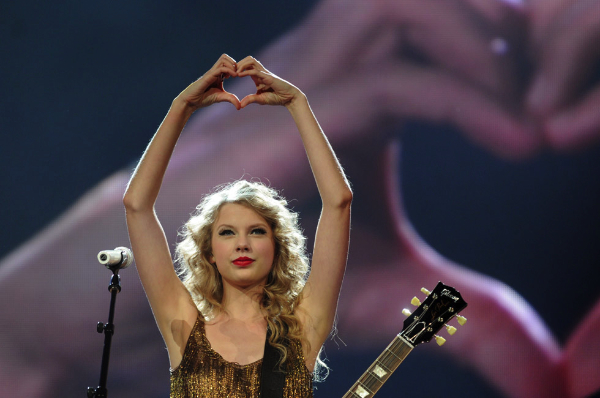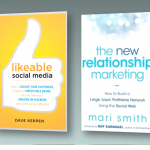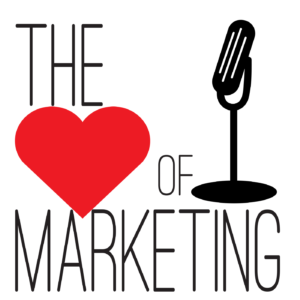Heart marketing is much more than touchy-feely emotional pandering to customers. It is smart business. For example, look at Taylor Swift.
Not only is she a gifted musician, singer and songwriter, but she is also a savvy marketer. She has 140 million followers on Facebook, Twitter, Instagram, YouTube and Tumblr. But it’s not the size of her digital footprint that makes such a huge impression. It is how she engages with her followers.
In this episode of The Heart of Marketing podcast, we look at what she does on social media to connect with her fans to build heart-throbbing loyalty. It’s the kind of loyalty that is the envy of any marketer in any business. We break down some of the secrets to her success and outline ways you can ‘Taylorize’ your marketing by:
- Building a likeable, credible brand by listening and responding to customers
- Creating memorable, remarkable experiences
- Telling a brand story that resonates with your audience
- Being accessible and transparent to win customer loyalty
- And more
001: The Taylor Swift School of Heart Marketing
Help us promote heart health
February is not only the launch month for The Heart of Marketing podcast, it is also Heart Month. Heart Month is sponsored by the American Heart Association to promote heart health awareness. You can help us support them by simply subscribing to our podcast in the month of February.
Here’s how it works: we will give $1 to The American Heart Association for the first 500 subscribers to The Heart of Marketing. Help us reach the $500 mark! You subscribe. We give. Everybody wins!
Show notes
John: Hi friends. Welcome to the Heart of Marketing. This is John.
Jayme: And this is Jayme Soulati. Welcome, welcome. I'm so excited, John.
John: Great. Right on cue, Jayme.
Jayme: We're already experts, even though we're just being born right now, this moment.
John: We're polishing our craft.
Jayme: How exciting to be with everybody at the Heart of Marketing Podcast. Subscribe, subscribe, subscribe!
John: We'd love to have you as our friends.
Jayme: Absolutely, of course, and social media has made us all be friends, John. What is going on in your world these days, John?
John: Well, I'll share one thing that's new, and it's really the most obvious one. This isn't new to you, Jayme, you know this, but it's new to our listeners. The most significant thing that's happened to me recently, I got married.
Jayme: I think that's wonderful. A big heart to you, a big heart.
John: Yes, thank you. In September, I got married, so we're in the honeymoon phase, and it's been just a wonderful blessing. We're going through changes in our lives together. I'd been living alone for the past 10 years, so having a housemate again is, actually the adjustment has been really easy. It's been great. That's kind of the most significant thing. It trumps everything else that's going on, so I thought I'd start with that.
Jayme: You know what, one personal thing. I think I'm going to narrow that right down to I won my court in the finals, the regional finals of tennis, just last weekend and I'm still on a high from that. My doubles partner and I took first place in the region at our level.
John: Wow. Congratulations.
Jayme: I'm pretty stoked, because that means my level now is a USTA 4.0 ranking, which if anybody plays tennis, they'll know what that means.
John: What about those of us who don't know?
Jayme: I think the people who play on the circuit start at a level 6.0. When you get up to being a 4.0 player, it's pretty significant. It's very competitive, tennis, and it's pretty much my life. I love, love, love the game and it's just like anything in marketing, John. You have to constantly reinvent. You have to perfect your strokes. You have to play a lot. You have to be in shape and fit. You have to look for better players to play with and it's very significant, at our age, to be doing this kind of thing on the court.
What's interesting though, really quick and share this. I looked around at the regional finals and I saw so many older people than I at the highest rankings of tennis in the world I play in and it was really rewarding to see that it's not a bunch of kids who are playing really awesome tennis right now. The kids starting out are amazing. They have energy and they have all this ability, but the cool thing is that a lot of people who are in their 60s are playing 4.5 tennis, which is a really amazing feat. I'm pretty impressed.
John: Very cool. I did not know that about you. I didn't know you were that good. I know that you play tennis, but I didn't . . .
Jayme: Well, good is relevant, right? Who knows? By someone's judgment, a lesser player will think I'm really awesome and the senior player would think I'm just average. As long as I believe I'm good, that's all that matters.
John: Great, yes.
Jayme: So what are we talking about today?
John: Well, what we're going to cover in the program today, the topic is the Taylor Swift's School of Heart Marketing. We're going to look at how she is rocking social media to connect with her fans and, more importantly, probably, to the listeners, is how you can apply what she's doing to your business.
Jayme: Well, I have to say, just a little backdrop here for the conversation, I have a 13-year old in my home and the very first concert I took my daughter to a couple of years ago was Taylor Swift's. I became a convert. I am a convert, an adult convert to Taylor Swift and her business model, who she is as a performer/entertainer, and just how amazingly everywhere she's a global rock star and a very solid business woman. I'm a convert.
John: Wonderful, I can't wait to get into it. You have a lot more perspective on this subject than I do, because I do not have a 13-year old. You know more about Taylor than me, but I'm learning and there are some amazing things that we have to talk about.
But before we get into it, let's talk about our special promotion that we have for the month of February.
Jayme: Perfect, go for it.
John: As some of you may know February is Heart Month, and it happens also to be the month that the Heart of Marketing Podcast is launching. So can you see where we might be going with this, friends?
What we want to do is get you involved with us in supporting Heart Month, and our launch, so what we're going to do is donate a dollar for the first 500 of you who subscribe to the Heart of Marketing Podcast in the month of February. By subscribing not only are you going to be subscribing to an awesome program, but you'll be lending your support to the American Heart Association, too. So please think about that--don't think about it, just do it. Just subscribe and we will keep you guys posted on how many subscribers we capture. Hopefully we'll get all 500, and Jayme and I will be $500 poorer at the end of the month.
Jayme: For a good cause, John, for a good cause.
John: For a great cause, yes. And that will be . . .
Jayme: Well I just wanted to add to that that the American Heart Association is the designee charitable organization for the Heart of Marketing Podcast. And rightly so, hearts equal hearts.
John: Okay, let's go right into our topic, Jayme. We're going to be talking about Taylor Swift on social. I got ahead of myself there. And what she is doing on social and how she makes heart connections on social. And then our last segment will be what we call the heart of the matter, and those are the nuggets that you can take away for marketing your business.
Jayme, I would like to let you tee this up a little bit here first because of your vast personal knowledge of Taylor Swift and her career and her music. I'm going to turn it over to you.
Jayme: Thanks. Well, I just want to give a little backdrop to this extraordinary woman because I am, as I said, a convert and when I went to do some research today for our show, John, I was just blown away by all the awards that she's already taken away at the tender age of 25.
John: Yes.
Jayme: She was born in 1989 and just celebrated her birthday in December. And the woman is a seven-time Grammy winner. She's the youngest recording artist ever to win a Grammy Award for Album of the Year. She has been on billboard Top 100 in the number one slot for six in ten weeks at a glance for all her songs. And she has won three People's Choice Awards. And the woman transitioned her career in country music over to pop just recently with her release of the album 1989, which went ridiculously global and was so successful in how many fans bought that album. And of course we bought it right away.
And of course we can't go without saying that beauty sells. I mean, the woman is drop-dead gorgeous. Obviously any time she takes a picture, whether she's doing a funky Instagram shot with her friends late at night, she's still a glam. She's still a glam.
John: Right.
Jayme: And here's the thing. She's their role model. And, John, I think you've done some research on the numbers of followers and likes she's gotten on social media.
John: Oh yeah. What kind of brought her to my attention, since I'm not in her demographic. I don't listen to her music or anything like that, but I came across an article on Digiday just recently called the Taylor Swift Guide to Social Media Marketing and, as I looked through it, a lot of things jumped out at me and that's why we decided to talk about her today.
They talked about how she's has 140 million followers on Facebook, Twitter, Instagram, YouTube, and Tumbler. They are primarily the platforms she's on. And also what was interesting was they talked about what she's doing on social media to really engage with her fan base. And things like she's very active in listening to what the fans are saying. And she's even come up with her own hashtag called TaylorKing, and it's for her stalking her fans. She said something like, "I stalk my fans because I care."
But what she does is she listening to what they're saying about her music, about her, what they're sharing about her. And then what she does are things like she'll retweet cover songs by undiscovered artists that cover her songs, people that share their wedding videos and that use her songs in their weddings. She's all over Instagram commenting constantly on posts, her own posts, and in fan's posts.
And the one thing in this article, and we'll imbed this in the show notes, because you have to see this. It's a YouTube video that she did at Christmastime, where she kind of tells a story of her picking some random fans of hers and selecting Christmas gifts for them, her going through the whole process of wrapping them and printing up a personal card with a personal message to them and sending it to them. And you get to see the fans reactions when they get the package from her and the messages. It's just very compelling. She's very savvy, obviously. The video tape, this whole thing, but it really shows you the connection that she has with her fans.
Jayme: Well, John, let me interject there.
John: Go ahead.
Jayme: You suggested several times that I watch that video, and I did this morning before we were going on air. And I can tell you I started to bawl.
John: I know.
Jayme: I was crying because of the reactions of these young women. And they might be late teens or early 20s. Taylor insisted she wanted to meet one of the fan's sons, a little baby son.
John: Yes.
Jayme: And I actually wrote a comment on the YouTube video. You'll see me say, "Oh my gosh, she's one rock star chica,” and I was sitting here bawling at the effect that she had on these kids and the notes that she wrote were two-page notecards in her own handwriting.
John: Yes.
Jayme: And the thing that's so remarkable is that I don't believe this is a publicity stunt.
John: No.
Jayme: When you dive into who she is as an authentic person, the CEO of her brand, she's a brand ambassador essentially and an influencer.
John: Right.
Jayme: She is really truly authentic, and is a totally genuine role model for her customers who are her fans.
John: Yes, definitely. I was stuck, too, by that personal touch of her communications. She has actual conversations with her fans and she engages with them as if they were friends.
Jayme: That's right. I think one thing that we always talk about in marketing, John, is storytelling. And when you think of a performer/entertainer, music performer, their songs are stories, especially country music. So Taylor's roots are in country music. In fact I was so impressed that this young girl two years ago, when she was 22 maybe, played about six or seven instruments, I believe. And she played them all during her concert and performed. It was pretty impressive. So the girl has been performing since she was two years old, playing instruments since she was two, so she's a natural artist. But back to the storytelling. I want to read something off of Taylor Swift.com on her webpage. It's about me from me, and this is very important for a CEO of a company to just kind of dwell on for a moment, John. If you don't mind I'd like to read that, okay?
John: Yeah.
Jayme: She says, "The debate over whether people can change is an interesting one for me to observe, because it seems like all I ever do is change." And John, we keep taking about how you and I have had to morph ourselves to be relevant.
John: Reinvention.
Jayme: She's 25, and she's already saying this. "All I ever do is learn from my mistakes, so I don't make the same ones again, but I make new ones. I know people can change, because it happens to me little by little every day. Every day I wake up as someone slightly new. Isn't it wildly intriguing and beautiful to think that every day we are new?
So when you read this, and look at the turmoil and the change, she moved to New York City recently and that's a huge jump for her in the sense of just uprooting what she knew in Nashville to New York, the biggest city on earth. And she said she was afraid of it. Until now she's embracing it. I wanted to just point out to companies, CEOs, marketers, that you do need to embrace change, and you need to look at ways to reinvent and connect.
I think connectivity, John, is one of the things that we both agree that she does very well.
John: Yes, huge. And one of the things, and this is the first time I heard this, Jayme, because you dug this up after our last conversation. One of the things that strikes me from hearing that little thing there, and I've noticed this throughout some of her other interactions, too. It's her willingness to be vulnerable.
Jayme: Absolutely, that's really important.
John: There are a lot of people, the haters that like to come out and troll around on the web and she just kind of shrugs it off and says, yeah, well, that's me. She does fun things with herself. She'll purposely post silly pictures that maybe other celebrities would find unflattering. But she puts them out there for her fans, because she knows that they might want to make a gift out of this, or a meme or something, but just the fact that she's willing to let down her guard and take the negative shots that might come, it just actually solidifies the relationship that she has with her fan base, because they just see a real person there.
Jayme: Well here's what's interesting. I'd like to ask you a question, John, about that whole thing you just said. A mid-tier company, should they be that vulnerable publicly? Should they take a failure and tell a story about it? Because the word hater--she has a song that's very popular and hit the charts, Hater's Going to Hate, Hate, Hate.
John: Oh.
Jayme: You didn't know that.
John: I didn't know that. I did not.
Jayme: I think you're breaking into a song there, John, because obviously that's a Taylor song right there. Well anybody who's that successful as a leader breaking out from the mold will have people throwing stones. And that's just happens in general.
But my question for you is this. Bring that back to mid-tier companies, should a marketer of a mid-tier company put out there a failure and then talk about it in story, or turn it around and make it a positive? What's your view?
John: Yeah, I think there are many opportunities that could come along for a company to do that. And in our industry, Jayme, we have a few buzzwords that we like to kick around. And one of them is transparency. We hear that all the time, be transparent. You hear it to the point where you just want to puke. But there is always an element of truth to it. I think there are times when a business can tell a story about how something that they tried to innovate did not turn out the way that they had planned. But what they learned turned into a whole different value proposition. There is something very powerful to be able to tell a story about that, share that. It doesn't have to be stripped to bare vulnerability. But show where you've made a mistake, and really the place to do it is in a PR gaffes, which is your realm, Jayme . . .
Jayme: Sure.
John: I'd let you speak to that more, but that's definitely the place where you just have to lay it down and say, we messed up.
Jayme: Well I think what you're trying to get at, too, John, and what I like to say is truth. Let's be truthful. There are so many companies right now who have CEOs in the spotlight who are negative. They ought to be in jail or be indicted. There is so much negativity right now in the C-suite of much larger corporations, I should say. And I think the mid-tier market can kind of fly under the radar a little bit more. They're not publically traded. They are more nimble. They can react quickly to errors in marketing or business decisions.
But it's not to say that a mid-tier company should not be transparent or be truthful. And in the era of social marketing where the customer has the top spot in communication inside of a company, we have to be able to answer the customer with truth. And I think Taylor Swift doesn't hide a thing about her personal life, in fact, all of her romances gone wrong. She was a mockery by some who were throwing the stones of, "Oh, you're dating too much." Let's be clear, the girl is drop-dead gorgeous and 20 something. Why should she date too much? And whose business is it?
John: Well how much is too much?
Jayme: I don't even know, but whose business is it that she has a boyfriend every six months? It's not our business. That's her personal life. But those who are on the raw star stage, just like a CEO of a company, they are going to get more glaring views of behavior. And because of the social marketing, social media, a lot of times C-suite is put out there for those observations to occur. It's not a thing that's right or wrong, but I'm saying the accessibility of Taylor Swift is what has made her so successful.
And I think the loyalty, going back to what she did at Swiftness, which is what she branded Christmas . . .
John: Yes.
Jayme: Those gifts that she gave and the time she took to write a personal note to her customers, her fan base essentially, they will be fans for life. And they will frame these things, and blog about it.
And let's talk about this for a second. We have not talked about the effects of the cascade of what she did. Those young women will be writing posts on Tumbler, taking Instagrams of their letters, telling everybody in the world that they got a gift from Taylor Swift and a handwritten note, and a visit from her.
So what she did exponentially to her brand, I mean the power that she has bestowed upon her brand, is astonishing.
John: Yeah, the word of mouth just explodes.
Jayme: The viral nature of what she's done, exactly.
John: And you know what, this kind of reminded me of something that I notice. One of the articles that I was reading about her social media activity was talking specifically about her Instagram. And it had a whole series of different kinds of posts that she had done on Instagram showing different aspects of what we have just been talking about. And what was interesting to me, not only the article itself, but then I scrolled down and read the comments. There were many, many people commenting who started out by saying, Well, I'm not even a fan of her music. I don't listen to this kind of music. But I was prepared to hate her, but man, she's likeable. And it was almost like she was starting to create new fans just because of her likeability. And I was feeling the same thing, too, like, man, she's really a nice person. I mean, she's really sweet. She's very genuine. It's like maybe I should go and get one of her CDs.
Jayme: Just go to iTunes and download a few and promote her brand, but what you're saying is really important as well for just branding in general, John. I think I like what you said into how can you tailorize your marketing?
John: Great, we're back.
Jayme: So let's tailorize marketing here and what does that mean for a company that has the ambition to be like Taylor?
John: Some of these things we talked about in the last segment a little bit, but I think they are worth repeating in context. But there are a number of things that we can point out that she does well that apply directly to your business. You don't have to be a rock star to rock marketing.
Jayme: Right.
John: And one of the things, and this may sound obvious, is a fundamental thing that is so easy to forget in the business world. And that is to put your customers or your followers or your fans at the center of what you do, at the center of your communications. She's a shining example of that. She's talking directly to people as friends, one on one. On the Christmas video she knew what presents to get the random fans that she was giving gifts to, because she went out and found out what they were talking about, what they were interested in. And then she thought of what she could do to create this great experience and surprise for them. And all of that involves keeping the focus on your customer, your product.
Jayme: And too, social media is hard work. Let's not be silly in thinking it's not, because it's a time suck. We all know that. I've been on Twitter religiously since 2009, and only recently have I gone back every now and again to visit Twitter. It's changed so drastically from those days of yore. But she has a team, obviously. She lives has an enormous team working for her to be able to dissect the customer base, the fan base. So she knows via her team who is who and what they are liking.
That's not to say that a company can't do the same thing. So the only way you're going to get enhanced customer connectivity is if you make the heart connection. You have to do something different with your customer to differentiate yourself from the guy down the street who is your competitor.
John: Absolutely, and that involves one of the other things that she does. It involves listening, and you kind of said that, too. Listening to what they're saying, and then responding in a relevant way with something that's relatable to your audience. That goes along with knowing them.
Jayme: You know, this is a really funny aside here, John, but as we were leading up to doing our first episode here together, Heart of Marketing, I started getting cold feet. And I started thinking, gosh, is anybody going to listen, because we're trying to talk to a major market of companies that are really attempting to be different and to be better and be authentic.
John: Yeah.
Jayme: And then I started realizing, wait a minute. Those top-level brands, the Kraft Foods of the world, and the Miller Lights and all those huge companies, do they care about seeing their customers? I don't think so, but they reminded me, too, of my favorite story from Babala. Babala is a tennis company that makes amazing racquets and shoes.
John: Oh yes.
Jayme: And I've become a convert because I was having a conversation with Brian Vickery on Twitter about Babala gear. I was in the market for a new racquet. Here comes the Babala guy on Twitter saying, "Hey, can I interject here? Mind if I give you a phone call?" And I was so impressed, because the guy called me up.
John: Right.
Jayme: He found my number and called me up and we had this massive conversation about racquets and strings. And I have to say that made me a loyal fan and customer, because of that personable interaction and relationship that they created with me. Have I talked to them since? No, but if I were to tweet Babala Tennis, they would be answering my tweets.
I think what it boils down to is this, John. A brand can be special to its customers if they are accessible to their customers, and do things that are authentic. And that's your connectivity. That's your relationship building. That's from the heart.
John: Yes.
Jayme: So the big takeaway for major companies and CEOs, owners, startups, it doesn't matter who you are, even larger brands that are pretty well on their way to high profits. You have to connect. You have to make the heart, you have to be human. You have to make the heart connection, and you can't just sit behind a news release and have a journalist tell your story. You have to be accessible.
John: Yes. Well we're running up against time here, but there are a couple more things that I think are important to touch on as they relate to takeaway for your business. And one of them which we haven't really spent much time on and it's a biggie, is Taylor's understanding of the unique culture of each social platform. She knows how to work Twitter. She knows how to work Instagram, and she understands in each of those social platforms, whether it's Facebook or Twitter or Tumbler, that the culture is different there. There are different aesthetics. There's a different tone to how people interact on that network. And she does a great job, and some of them are more obviously more visual. She does a great job of customizing her message for each network. And that's something that every business also needs to keep in mind. You just can't regurgitate the same post across all of the social networks that you're on and expect to make a connection. It's not going to happen. In fact you're just wasting your time.
Jayme: That's a really valid point, John. That's very valid, yes. What else do you have there?
John: Well the one last one is kind of more of a philosophical point to take away from all of this. But I think it's important for businesses to not think of social media as a marketing channel. It's not. Think of it as a relationship channel, and that's what Taylor does with everything she does. It's a place you go to connect with some of your customers, your fans. And you just build a relationship, and the business will come out of that relationship. But it's too often, and Jayme, I said this the other day. You'll laugh, but I said, "When your marketers get tunnel vision, and the only tool in your toolbox is a hammer, everything looks like a nail." And it can be that way with marketing as well. They take a look at social media and say, "Oh look, a great, new channel for me to annoy the heck out of people and sell, sell, sell." And the reality is that people don't go on social media to have a conversation with a brand. And they don't go on social media to shop for stuff. They go there to talk to friends, to be entertained, and maybe to be informed. And I think if you can enter into their mind set and engage with them at that level you're much more likely to get the results that you're looking for.
Jayme: That's a great point to wrap up, John. But Taylor is a product of social media. She has mastered the use of social media and also the connection with her customers via social media. And I think that's really one thing to leave with.
John: Yes.
Jayme: You too can be a master of social marketing if you have the strategy to support you and the oomph, because it does change. It's accessibility, it's authenticity, it's being truthful and transparent, and available to people who want to communicate with you.
John: You just led me perfectly into what I wanted to say here as we wrap up. And that is we want to invite you to give us your feedback on the program, what you like, what you'd like to hear if there's a specific topic you'd like us to touch on. If you have questions that you'd like us to take a shot at answering, tweet us up. Jayme you are at . . .
Jayme: . . . Soulati.
John: And I am at Digitaljgo on Twitter, so look us up there, or you can look us up on our website and leave comments or send us a note there. We'd love to hear from you really, and get some idea from you on what you like. We want to be able to do all we can to give you that.
Jayme: Perfect.
John: That's our show for today. Jayme, take us home.
Jayme: Hey everybody, go be rock hot. Thanks for listening. See you soon.
John: Until next time, remember, go for the heart. You won't go wrong.
Announcer: Thanks for listening to The Heart of Marketing Podcast, with Jayme Soulati and John Gregory Olson. Don't miss our next program. Subscribe to The Heart of Marketing Podcast today.
The Taylor Swift guide to social media marketing
Taylor Swift: Queen of celebrity social media
Taylor Swift’s comments to her fans on Tumblr are just perfect
Taylor Swift drops new album clue on Instagram, but what does 18 mean?












Speak Your Mind